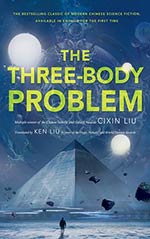
![]() verkisto
verkisto
7/26/2016
![]()
When it comes to finding new fiction to read, I look through a lot of resources. I look at what friends are reading and recommending, the io9 monthly release posts, various lists I come across on the Internet, etc. The Three-Body Problem showed up in almost all of those places, so it moved up on my to-read list.
Since I'd heard so much about it, though, I had high expectations for it, and sometimes that's a death knell when the book fails to meet those expectations. For the most part, they were met; the science and idea behind the story was fascinating, and seeing how it all came together against the backdrop of the Cultural Revolution was intriguing. It was thoughtful and meaningful, and the high points were well worth the read.
If you want to know what the story is about, you can find that information easily through a small amount of research. If you find the book in a bookstore, you can get it right off the dustjacket copy. The thing is, once I had determined I was going to read the book, I didn't go that far, and was pleasantly surprised with how the story developed. What the copy tells you doesn't happen until past the halfway point of the book, and since the majority of the first part of the book is about an unusual video game where players are trying to solve problems of science and philosophy, there's a lot of mystery that's spoiled by knowing what the core story is. So I'm going to skip that part and recommend you read it knowing as little as possible.
The mystery is fascinating, which is good since that's what carries the story. The characters are a bit flat, and don't carry the story along well enough on their own. The book is also the first in a trilogy, meaning that much of what happens in the novel is exposition, so there aren't any grand revelations or conclusions to be found in the novel. In fact, the book ends rather abruptly, with more questions left to answer. What it sets up, though, is promising, and I'm interested in seeing where Liu takes us in the remaining volumes.
Something else I enjoyed about the book were the translator's notes included to give better context into the events surrounding the Cultural Revolution and Chinese culture in general. They helped to better understand what was happening, and while none of them were necessary to understand the story, it made the historical backdrop of the story more real. Also, the translator included his own afterword where he talked about the process of translation and how he approached the task. It was interesting to learn that Chinese storytelling differs somewhat significantly from Western storytelling, and that the translator took some liberties (approved by the author, he notes) with parts of the narrative to make it a better read for the English-speaking world. I like behind-the-scenes trivia, so I really enjoyed reading about that; it reinforces the idea that in order to truly read literature in another language, you should learn that language and read the literature as it was originally written. That's not to say that I don't appreciate the translation, though, since I don't have that kind of free time.
Overall, I liked the book, and I think anyone who's interested in hard science fiction should give it a read. It lives up to the expectations, and I don't think anyone who has praised it has oversold it. I only wish the next volume were available right now.